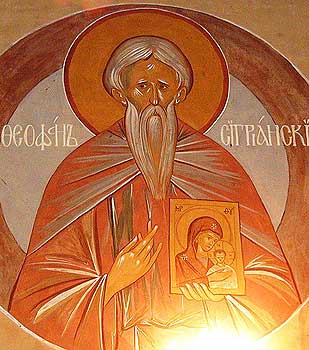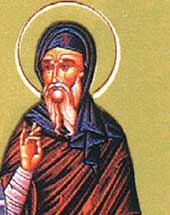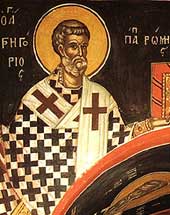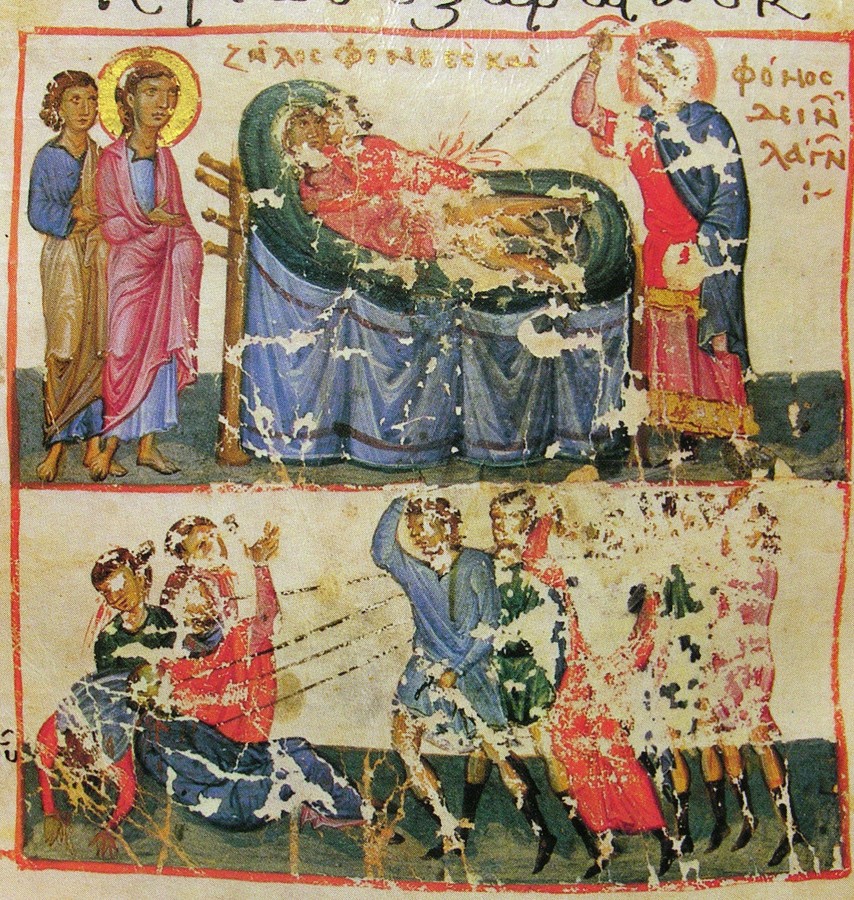|
|
Our Holy Father Theophanes the Confessor Named "the Sygrian" from his birthplace, Sygriane, he was a kinsman of the Emperor Leo the Isaurian (717-41) and his son Copronvmos (741-75). He had enormous wealth and lived in great splendour. But all this lost its value for Theophanes when he enthroned Christ the Lord in his soul. Then he was hindered by a marriage which he was obliged to make. He succeeded, though, in persuading his bride that they should live as brother and sister in chastity, and, as soon as his parents died, his wife went to one monastery and he to another. His monastery was in the Syrian mountains in the Cyzicus region. The splendid and wealthy Theophanes lived for some time in the monastery as the poorest wretch. And all marvelled at the great change in him. Then, because he had become so known for his firm faith, abstinence and wisdom, he was invited to the 7th Ecumenical Council at Nicaea in 787, at which the veneration of icons was upheld. Because of his great purity and chastity, God gave him the gift of wonder-working and he was able to heal all manner of illness, especially mania and madness. He prayed to God for all the sick and distressed and helped them by his prayers. Only when he himself fell ill and was sick for a long time did he refuse to pray for his own healing but endured it with thanksgiving. When another iconoclast period arose under the wicked Emperor Leo the Armenian, Theophanes was taken to Constantinople and thrown into prison, where he spent two years in discomfort, pain and humiliation. The Emperor then sent him into exile on the island of Samothrace, an exile which he had forseen in his spirit and foretold to the prison warders. When he arrived on Samothrace, he lived for only twenty-three days, then went to his Lord and Creator to receive the deserved wreath of glory. Named "the Sygrian" from his birthplace, Sygriane, he was a kinsman of the Emperor Leo the Isaurian (717-41) and his son Copronvmos (741-75). He had enormous wealth and lived in great splendour. But all this lost its value for Theophanes when he enthroned Christ the Lord in his soul. Then he was hindered by a marriage which he was obliged to make. He succeeded, though, in persuading his bride that they should live as brother and sister in chastity, and, as soon as his parents died, his wife went to one monastery and he to another. His monastery was in the Syrian mountains in the Cyzicus region. The splendid and wealthy Theophanes lived for some time in the monastery as the poorest wretch. And all marvelled at the great change in him. Then, because he had become so known for his firm faith, abstinence and wisdom, he was invited to the 7th Ecumenical Council at Nicaea in 787, at which the veneration of icons was upheld. Because of his great purity and chastity, God gave him the gift of wonder-working and he was able to heal all manner of illness, especially mania and madness. He prayed to God for all the sick and distressed and helped them by his prayers. Only when he himself fell ill and was sick for a long time did he refuse to pray for his own healing but endured it with thanksgiving. When another iconoclast period arose under the wicked Emperor Leo the Armenian, Theophanes was taken to Constantinople and thrown into prison, where he spent two years in discomfort, pain and humiliation. The Emperor then sent him into exile on the island of Samothrace, an exile which he had forseen in his spirit and foretold to the prison warders. When he arrived on Samothrace, he lived for only twenty-three days, then went to his Lord and Creator to receive the deserved wreath of glory.Our Holy Father Simeon the New Theologian This great and godly Father of the Church was born in Galatai in Paphiagonia and educated in Constantinople, where he entered the imperial service. He left all for Christ and took himself off to a monastery, living in asceticism under the guidance of an elder, Simeon, then becoming abbot of the monastery of St Mamas and finally a hermit. He was the greatest theologian since St Gregory the Theologian. His writings, illumined with the grace he carried in his heart, are a true theological revelation. He entered into rest in 1022, leaving wonder-working relics. This great and godly Father of the Church was born in Galatai in Paphiagonia and educated in Constantinople, where he entered the imperial service. He left all for Christ and took himself off to a monastery, living in asceticism under the guidance of an elder, Simeon, then becoming abbot of the monastery of St Mamas and finally a hermit. He was the greatest theologian since St Gregory the Theologian. His writings, illumined with the grace he carried in his heart, are a true theological revelation. He entered into rest in 1022, leaving wonder-working relics.St Gregory the Dialogist, Pope of Rome Son of the senator Gordianus, he himself became a senator and governor of the city of Rome, but, as soon as his father died, he gave himself to the spiritual life. He built six monasteries in Sicily and a seventh in Rome itself, out of his great wealth, being tonsured in this last, which he dedicated to the Apostle Andrew. His mother, Sylvia, also received the monastic habit in a women"s monastery. After the death of Pope Pelagius, Gregory was chosen as Pope. He fled from this honour and power and hid himself in the mountains and ravines, but God showed people where to find him by making a fiery column, reaching from earth to heaven, appear at the place where Gregory was hiding. He had a rare compassion, using all his income for the housing of the poor and on hospitality. He frequently brought the poor in and fed them from his own table. He occupied himself with the writing of instructive books. "The Dialogist", or "the one who converses" was the name he was known by, having written a book entitled "The Dialogues" in which he brought to light the virtues and miracles of the Italian saints. He also compiled the service of the Presanctified Gifts that is used on Wednesdays and Fridays in the Great Fast. His archdeacon, Peter, often saw a dove hovering over his head when he was writing. He went to the Lord in 604. Son of the senator Gordianus, he himself became a senator and governor of the city of Rome, but, as soon as his father died, he gave himself to the spiritual life. He built six monasteries in Sicily and a seventh in Rome itself, out of his great wealth, being tonsured in this last, which he dedicated to the Apostle Andrew. His mother, Sylvia, also received the monastic habit in a women"s monastery. After the death of Pope Pelagius, Gregory was chosen as Pope. He fled from this honour and power and hid himself in the mountains and ravines, but God showed people where to find him by making a fiery column, reaching from earth to heaven, appear at the place where Gregory was hiding. He had a rare compassion, using all his income for the housing of the poor and on hospitality. He frequently brought the poor in and fed them from his own table. He occupied himself with the writing of instructive books. "The Dialogist", or "the one who converses" was the name he was known by, having written a book entitled "The Dialogues" in which he brought to light the virtues and miracles of the Italian saints. He also compiled the service of the Presanctified Gifts that is used on Wednesdays and Fridays in the Great Fast. His archdeacon, Peter, often saw a dove hovering over his head when he was writing. He went to the Lord in 604.Righteous Phineas the grandson of Aaron The Righteous Phineas, grandson of the High Priest Aaron (also commemorated today) and son of the High Priest Eleazar, was also a priest and zealous in his service.
When the Israelites, after the holy Prophet Moses (September 4) led them out of Egypt, were already near the Promised Land, their neighbors the Moabites and Midianites were overcome by fear and envy. Not trusting in their own strength, they summoned the magician Balaam to put a curse on the Israelites. The Lord revealed His will to Balaam, and Balaam refused to curse the People of God, seeing that God was pleased to bless them (Num. 24:1)... The Righteous Phineas, grandson of the High Priest Aaron (also commemorated today) and son of the High Priest Eleazar, was also a priest and zealous in his service.
When the Israelites, after the holy Prophet Moses (September 4) led them out of Egypt, were already near the Promised Land, their neighbors the Moabites and Midianites were overcome by fear and envy. Not trusting in their own strength, they summoned the magician Balaam to put a curse on the Israelites. The Lord revealed His will to Balaam, and Balaam refused to curse the People of God, seeing that God was pleased to bless them (Num. 24:1)... |